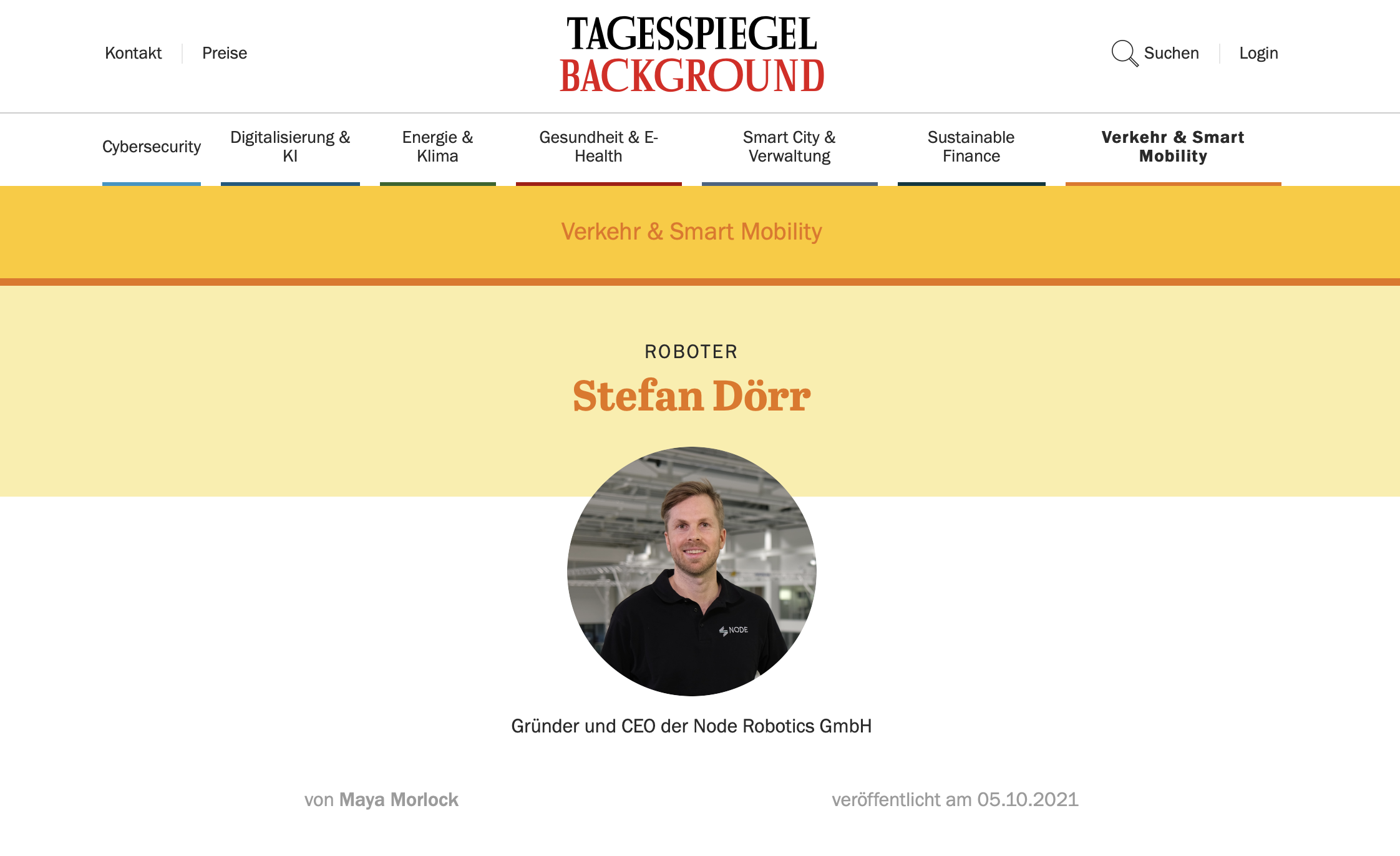Stefan Dörr dreams of a completely autonomous factory. There, mobile robots would independently perform a wide range of tasks within the value chain. ‘I imagine a large fleet – a kind of ”Mainzelmännchen” that supports me in all tasks that arise’, says the 35-year-old. The fleet would be highly specialized: whether transport robots that bring products from A to B, mobile assembly assistants, automatic quality assurance via drones or autonomous trucks that are unloaded by robots – only with this diversity the necessary flexibility and efficiency would be given, says the engineer.
‘The vision is to develop a completely self-organizing system that keeps production running – the smartphone principle for the factory, so to speak. A universal tool into which I can easily integrate what I need’, Dörr says. However, from a technological point of view, this is still some way off, he adds.
Focus on non-public space
His startup, NODE, develops the software for driverless transport robots to provide autonomous and flexible material flow within a factory. The goal, he says, is a plug-and-play solution: factory managers buy the hardware in the form of a fleet of robots from a separate vendor, and then run the NODE software on them. Already today, Autonomous Mobile Robots (AMR), which are loaded with Dörr’s software, are replacing less flexible intralogistics solutions, such as Autonomous Guided Vehicles (AGV), which are guided on fixed tracks. Orders are generated through a warehouse management system. ‘Depending on size, load status and processing times, different vehicles from the fleet come into question’, Dörr explains. The algorithm defines which robot ultimately sets off. The transport robots find their own way via sensors and therefore can avoid obstacles.
NODE focuses on non-public spaces for strategic reasons, he says. ‘We already had business cases in the public sector, but due to changing requirements, especially in the area of safety, these are less attractive to us at the moment’, Dörr says. Therefore, autonomous robot fleets are only used within factories.
According to Dörr, it is still a dream of the future that the “Mainzelmännchen” will seek out their own tasks. ‘We want to bring more and more autonomy to the robot. The more local intelligence can be developed, the less has to be defined manually’, he says. For this, goal-oriented algorithms would have to be integrated in the future. In addition, the robots would have to be connected to a cloud so that they can network with each other and aggregate the data they need.
Building robots instead of becoming a professional soccer player
The start-up was only founded in November 2020. Therefore, it is surprising that NODE’s customers and partners already include giants such as Audi with Bär Automation, the Japanese automotive supplier Denso and the BMW Group. BMW alone already has around 400 vehicles equipped with various software components from NODE, he said. ‘We actually have a bit of a head start, because our technological origins go back to 2013’, Dörr explains. At that time, he was a research associate at the Fraunhofer Institute working on production technologies, assistance systems and the automation of robots. ‘There I was able to take off the application blinders and see what was possible’, he says. NODEs’ team and co-founders Jannik Abbenseth and Kai Pfeiffer also come from the Fraunhofer Institute.
Dörr never imagined that one day he would develop autonomously acting robots. Born and raised in Stuttgart, he pursued a career as a professional soccer player for a long time. He went through several performance centers at VfB Stuttgart, but serious injuries bothered him repeatedly. ‘In retrospect, the injuries were a blessing, because it forced me to seriously ask myself: what else am I interested in?’ says Dörr. It then took him the first two years of his studies at the Technical University of Munich in mechanical engineering to focus on software development, automation and control engineering.
As an intern at BMW, he eventually worked on self-driving cars and driver assistance systems and caught fire. ‘What fascinates me about robots is the analytics and the challenge of getting them on the road’, he says. It seems that he is attracted to figuring out what is still unknown, because Dörr is also enthusiastic about the universe. He dreams of studying astronomy on his own so that he can work in a large observatory for a while and explore the stars.
4 Questions to Stefan Dörr
1. What car will you buy next?
None. I hope that car sharing and alternative means of transportation will become so established that I won’t need one anymore.
2. What do you think about flying?
I prefer to take the train and hope that the service here will improve in the future. But sometimes, flying is unavoidable.
3. Who sets the pace in the mobility industry?
Picking out just one here doesn’t do justice to the large number of relevant players. But Tesla would certainly appear in my list of the top 10.
4. Where would you like to reinvent the wheel?
Energy generation.
by Maya Morlock
The article appeared in Tagesspiegel Background Verkehr & Smart Mobility on 05.10.2021.

